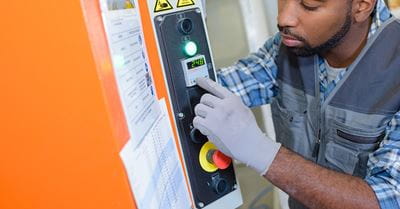Vertical Reciprocating Conveyors | Portland

Raymond West supplies warehouse automation equipment such as VRC's.
We are among the largest suppliers of warehouse automation equipment in the state.
Call us today at (800) 675-2500.
What Is a Vertical Reciprocating Conveyor (VRC)?
A vertical reciprocating conveyor is a safe, relatively inexpensive, simple way to transfer goods from one elevation to another. VRCs have applications in a host of different industries, including factories, storage facilities, distribution centers, and other multi-story operations. These versatile pieces of equipment may be readily integrated with a building’s basement, mezzanine, balcony or any upper floor levels.
VRC’s consist of a shaft, a carriage, and a hydraulic or mechanical system. Vertical material lifts can be installed just about anywhere within or even outside of a building. Barriers and cages installed around VRC shafts ensure employee safety and well being.
What Are Some Advantages of VRCs?
Safety: Many facilities are dependent upon forklifts for vertical movement of products. While ideal for moving many different materials, forklifts are mainly intended for the horizontal movement of goods. To save time and effort, workers may occasionally extend their forklifts beyond their vertical limit or transport loads in excess of their equipment’s capacity rating. When such infractions occur, the likelihood of a serious accident increase substantially.
For some vertical product movement, VRCs offer a safe and effective alternative to lift trucks. Specifically engineered and built for each operation’s application requirements, VRCs greatly reduce the chances of human error.
Additionally, vertical material lifts are built to move larger loads more often. These faster cycle rates mean reduced labor expenses. For companies that have routine vertical lifting needs, vertical reciprocating conveyors can improve safety and decrease costs.
Customization: One major benefit to VRCs is the extent to which they can be customized. Because passenger elevators are designed to safely move humans, there are numerous regulations that restrict the weight capacity, speed and size of these mechanisms. While such safeguards are appropriate for safely transporting people, they are not necessary for high volume movement of products in production facilities, storage facilities and distribution centers. Vertical lifts can be readily customized because they are not bound by the same laws as passenger elevators.
Regulation: VRCs are designed to move materials only, while standard elevators are designed to move both people and freight. Because of this fundamental distinction, VRCs are exempt from the strict elevator rules in many states.
On the contrary, VRCs are regulated by their own universal code that is overseen by the American Society of Mechanical Engineers (ASME), one of the original standards defining organizations in the nation. More specifically, vertical reciprocating conveyors must comply with ASME’s Safety Standard for Conveyor and Related Equipment (ASME B20.1-2018). This standard outlines the rules for the construction, assembly, operating procedure and maintenance of conveyor systems.
Raymond West Is A Full Service Supplier of Vertical Reciprocating Conveyors
If you’re in the market for a VRC, have questions or need engineering support, Raymond West can give you a hand. Our material handling experts can help plan, procure, set up and maintain a system that’s right for your business. Get in touch with us today!
Raymond's Portland service operation includes all of Western Oregon and Southwest Washington, including Portland, Beaverton, Tigard, Hillsboro, Forest Grove, Sherwood, Tualatin, Wilsonville, Oregon City, Gladstone, Clackamas, Milwaukie, Happy Valley, Gresham, Troutdale, Woodburn, Salem, Vancouver, Ridgefield, Longview, Kelso and surrounding areas.
Raymond West | Portland Material Handling Equipment Supplier
3148 NE 181st Ave
Portland, OR 97230
(800) 675-2500
